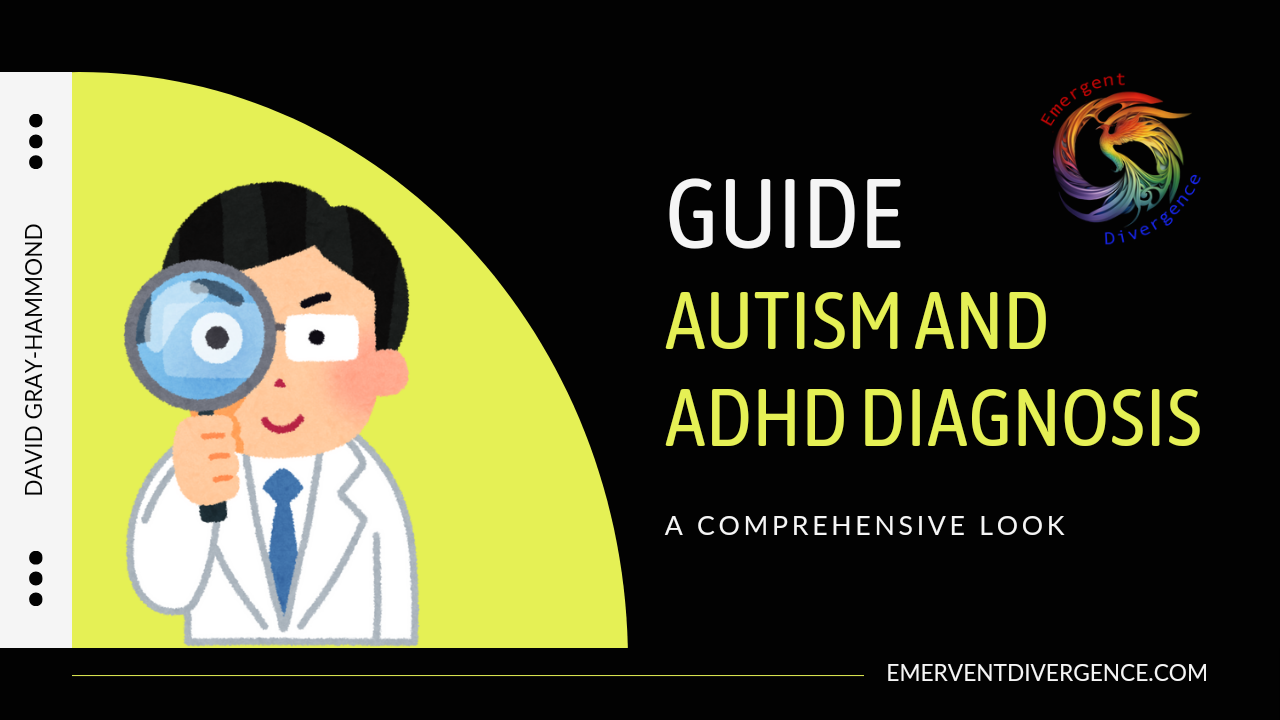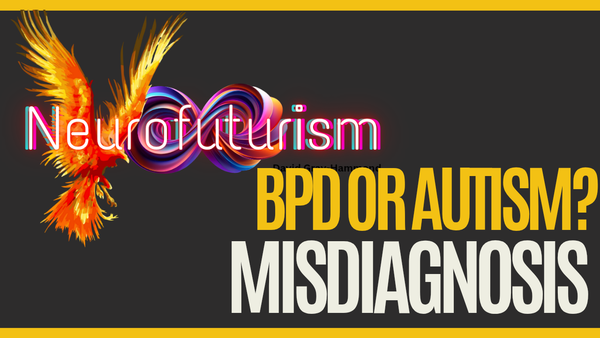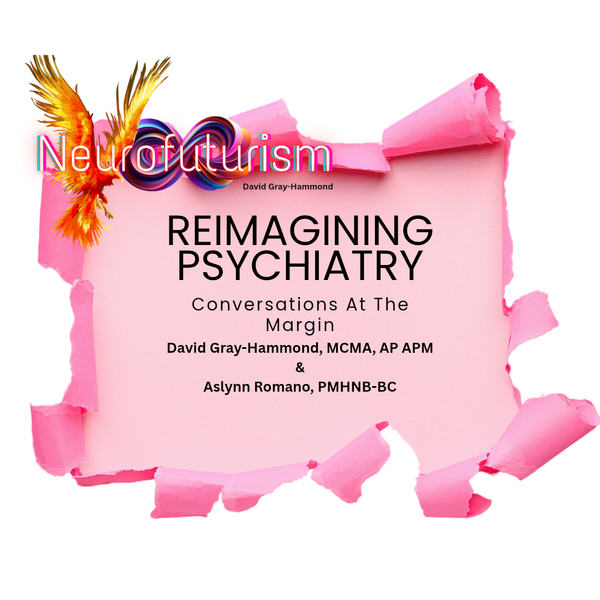A guide to autism and ADHD diagnosis in the UK
Everything you need to know about autism and ADHD diagnosis in the UK. From the barriers to access through to the process itself.

While the neurodiversity movement seeks to demadicalise Autistic and ADHD experience, there are still many cases where having a diagnosis given by a medical professional can be beneficial. Despite the benefits of being diagnosed, these processes can often feel overwhelming and inaccessible. This article is intended to help make the process feel a little less confusing by collating as much information as possible on the processes in the UK, from the benefits of knowing your Autistic identity, to the benefits of seeking a formal diagnosis, and the process itself.
- What are the benefits of knowing you are Autistic or ADHD?
- What are the benefits of getting a formal diagnosis of autism or ADHD?
- What are the barriers to getting diagnosed?
- What does the diagnostic process look like for Autism or ADHD?
- Preparing for a referral and assessment
- What is 'right to choose' and how can it help with an autism or ADHD diagnosis?
- What can I do to support myself after an autism or ADHD diagnosis?
- Where can I go to learn more about my diagnosis?
What are the benefits of knowing you are Autistic or ADHD?
One of the questions that is asked a lot is, "Should I tell my child they are Autistic and/or ADHD?" Common arguments against this are:
- The child will be medicalised. This is particularly relevant to people who have had negative experiences of the medical institutions.
- The child will be stigmatised and bullied. Many parents fear that their child being openly neurodivergent will lead to them being treated worse.
- The child will doubt themselves. Parents may fear that a child will see their existence as being of less value.
- A fear that diagnosis will hold the child back in life.
This list is not exhaustive and echoes what a lot of neurodivergent adults worry about when they are deciding of they relate to autism or ADHD later in life and whether to be open about it. Regardless of age, here are some of the benefits of knowing you are Autistic or ADHD:
- Improves self-confidence. Autistic and ADHD people often have very negative opinions of themselves due to negative attitudes towards their difference throughout their life. Knowing they are Autistic or ADHD can help them to understand that their isn't a problem with them and that they aren't alone in their difference.
- Access to community. When we know we are Autistic or ADHD, it gives us a starting point for finding people who share our experiences and making a meaningful connection. Accessing community has been shown to improve wellbeing in Autistic people.
- When people understand their struggles, they can start to find solutions. Many neurodivergent people describe feeling broken and hopeless before discovering their neurodivergent identity and describe the feeling of relief when they discover they are just different.
- Knowing of our diagnosis helps us be signposted to more appropriate support. Part of finding the best path through life is to know what terrain is most accessible for you.
What are the benefits of getting a formal diagnosis of autism or ADHD?
I have at times doubted my Autistic identity. I have been so adept at concealing parts of myself that I have doubted their existence. This is all-the-more complicated due to the abstract nature of autism. It is not a natural kind, it is a social descriptor that existed originally to segregate my mind from those who can perform neurotypicality. For this reason, my Autistic experience is often one of Self-doubt and imposter syndrome.
What it feels like to be Autistic (2023)
It logically follows that if their are benefits to knowing you are neurodivergent, their must be benefits to getting a formal diagnosis. While the neurodiversity movement seeks to end the medicalisation of neurodivergence, their are so notable benefits to getting a formal diagnosis in our current society. These include:
- Reduces the feeling of imposter syndrome. Many Autistic and ADHD people are made to feel like they are wrong about their own identity and experiences. A formal diagnosis can help challenge this unhelpful belief by giving a recognition in line with current understandings of neurodivergence.
- Much of the limited support that exists is locked behind diagnosis. While there is a growing provision of support in the UK that doesn't require a diagnosis, having one formally given can open certain doors that may help to balance the struggles we experience.
- Formal diagnosis often gives us permission to accept who we are rather than try to meet external expectations. A lot of neurodivergent people describe a feeling of liberation to be themselves when they recieve a formal diagnosis.
- For ADHD people, a formal diagnosis can give them access to ADHD medication which has been shown to improve outcomes for those taking it.
The decision to get diagnosed should ultimately be one made by the individual (where they have the necessary capacity to do so). It can not be understated enough that autonomy is important in this situation, and that getting a diagnosis may help improve a person's life on multiple fronts.
What are the barriers to getting diagnosed?
Perhaps the most common barrier to diagnosis that is discussed is the intersection with gender. ADHD diagnoses are given at a 2:1 ratio of Men:Women repectively. Autism has been diagnosed at a rate for 4:1 favouring men again. It is now being recognised that this may come down to biases in diagnostic criteria and academic literature rather than being a true feature of the two diagnoses. It should be noted that this issue is further compounded if you are Trans or gender diverse. Essentially, not being a cis-gender male is a significant barrier to being diagnosed.
Further writing on this website has also discussed that race and ethnicity also present barriers with white individuals having better access to diagnosis than any other group. The likelihood of diagnosis also decreases as an individual gets older. Essentially, young white males are far more likely to be diagnosed than any other group.
Beyond intersectional experiences impacting on access, professional competency is also a significant issue. Many diagnosticians lack the cultural experience to identify autism and ADHD accuracy, leaning heavily on stereotypes and overly literal interpretations of diagnostic criteria that fail to capture the diversity and nuance of presentation and experience. It is useful to consider whether an independent advocate with cultural competency in neurodivergence might help ease the diagnostic process.
What does the diagnostic process look like for Autism or ADHD?
While different areas may vary on the precise route through the diagnostic process, this section will aim to give a general overview of what the different parts of the UK look like for this process. It should be noted that NHS referrals for autism and ADHD diagnosis are often years long due to the high demand they are under, more on this follows this section.
England
- Referral- The process usually starts with a referral by a healthcare professionals to a service that can assess and diagnose autism and/or ADHD. In most cases, you will approach your GP in the first instance.
- Pre-Assessment Screening- Once the referral has been received, you will receive questionnaires that aim to decide if you are likely to meet diagnostic criteria. Their can be a lot of paperwork at this stage, and it is advisable to have someone help you complete this. If your screening indicates that you would benefit from diagnosis, you will be placed on a waiting list for a formal assessment.
- Formal Assessment- Eventually, you will be invited to an assessment, often conducted by a multi-disciplinary team. Regardless of ages they will usually ask for input from a family member who knew you well in childhood. It is not always necessary for that person to be a family member as long as their is a reliable way for them to establish your experiences in childhood.
- Post-Assessment- You will receive a written report on your assessment. If you have been diagnosed ADHD, you may then also be placed on the medication pathway to wait to be titrated onto medication.
Wales, Scotland, and Northern Ireland
The diagnostic process in Wales, Scotland, and Northern Ireland follows a similar path to that in England. As with England, different areas may vary somewhat, but they largely follow the same pattern.
Preparing for a referral and assessment
When preparing to ask for a referral to be assessed and diagnosed, there are some things that can be helpful to do in order to make the case of why you need a referral:
- Write down the aspects of your experience that you feel will show you are Autistic and/or ADHD, take this to your appointment with you to help you remember.
- Resources that may help you decide the points you want to make (from aucademy.co.uk and adhduk.co.uk)
- Unofficial Autism Checklist- an in depth questionnaire designed by Autistic people that take a deep dive into multiple facets of Autistic experience.
- Autism Spectrum Quotient- One of the more formal screening tools used in the process.
- Aucademy "Starting your discovery journey" page.
- Adult ADHD Self-Screening Tool
What is 'right to choose' and how can it help with an autism or ADHD diagnosis?
Waiting lists for autism and ADHD assessment are often months or even years long. For those looking to wait less time, it may be helpful to consider the "right to choose" pathway. This pathway is currently only available in England, and allows the NHS to refer you for a fully funded assessment with certain private providers. Here is a video on the topic:
https://videopress.com/v/uPBGLhdK?resizeToParent=true&cover=true&preloadContent=metadata&useAverageColor=true Please note this video forgets to mention that this only available in England currently.
It should be noted that some people experience issues regarding "shared care" following a right to choose diagnosis. This is relevant to people accessing ADHD medication as NHS services may refuse to prescribe medication initiated by the private provider, insisting on an NHS diagnosis. While they are not supposed to do this, it may help to ensure you have written agreement that shared care will be honoured if this is relevant to you.
What can I do to support myself after an autism or ADHD diagnosis?
Following an autism or ADHD diagnosis, there can be a "what now?" feeling with very little post-diagnostic support in the UK. Despite this, there is a rich community and culture of neurodivergent people existing online where you can connect with other neurodivergent people. As mentioned earlier, being connected to your peers has been shown to improve our wellbeing and mental health.
- Emergent Divergence- The Page associated with this blog
- Autistics Worldwide- Facebook group for Autistic and otherwise neurodivergent adults
Discord
These suggestions are a drop in the ocean, but will give you access to further recommendations for connecting with Autistic and ADHD people.
Where can I go to learn more about my diagnosis?
If you wish to take a deeper look at neurodivergent experiences, you can visit my page that lists resources and training and my pages on essential reading and supporting Autistic people.
Whatever stage of your journey you are at, I wish you luck, and want you to know that you are not alone. As I final note I would like to add that some people are not diagnosed because they can't access it, or do not wish to. This is considered valid in wider neurodivergent circles, and we should not exclude people for not having their identity written on a piece of paper. You are all valid.
I produce much of this content for free, and put alot of time into it. If you are in a position to do really tip is very much appreciated. If you wish to, the button below will allow you to give a tip of whatever amount you wish.


